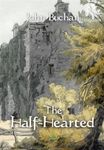39 books
-
1. The Richard Hannay Collection: The Thirty Nine Steps, Greenmantle and Mr Standfast

Major General Sir Richard Hannay is a fictional secret agent created by Scottish novelist John Buchan and made further popular by the 1935 Alfred Hitchcock film The 39 Steps. Buchan’s resourceful, German-speaking spy is partly based on Edmund Ironside, from Edinburgh, an espionage operative during the Second Boer War. The Richard Hannay Collection – The 39 Steps, Greenmantle and Mr Standfast presents the first and best three Richard Hannay adventures: The Thirty Nine Steps Hannay arrives in London on the eve of World War I, where he meets an American agent seeking help in stopping a political assassination. Before long, Hannay finds himself in possession of a little black book that holds the key to the conspiracy — and on the run from both the police and members of a mysterious organization that will stop at nothing to keep their secrets hidden. Greenmantle Hannay is called in to investigate rumors of an uprising in the Muslim world, and undertakes a perilous journey through enemy territory to meet his friend Sandy in Constantinople. Once there, he and his friends must thwart the Germans" plans to use religion to help them win the war, climaxing at the battle of Erzurum. Mr Standfast Recalled from duty on the Western Front by spymaster Sir Walter Bullivant, Hannay goes undercover as a pacifist, working to outwit a dangerous German spy and his agents. Guided by his contact—and love interest—Mary Lamington, Hannay tracks his enemy from London to Glasgow to the Scottish Highlands, eventually confronting him in a dramatic climax above the battlefields of Europe. The title refers to a character in John Bunyan"s Pilgrim"s Progress, to which there are many other references in the novel; Hannay uses a copy of Pilgrim"s Progress to decipher coded messages from his contacts, and letters from his friend Peter Pienaar. This digital edition of The Richard Hannay Collection – The 39 Steps, Greenmantle and Mr Standfast includes an image gallery.
-
2. The Three Hostages

Hannay is married to Mary and living peacefully in the Cotswolds, when he receives a request to help solve the mysterious kidnapping of the children of three prominent people. Given nothing to go on but a few mysterious clues, Hannay, assisted by friends like Sandy Arbuthnot, must track down the dastardly villains behind the plot before it's too late...
-
3. The Thirty Nine Steps
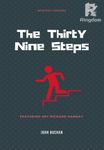
Richard Hannay arrives in London on the eve of World War I, where he meets an American agent seeking help in stopping a political assassination. Before long, Hannay finds himself in possession of a little black book that holds the key to the conspiracy — and on the run from both the police and members of a mysterious organization that will stop at nothing to keep their secrets hidden. John Buchan"s The Thirty Nine Steps has been called the first great espionage novel. It has been embraced by each new generation and shows no sign of losing popularity.
-
5. The 39 Steps
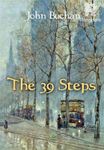
Europe is close to war and spies are everywhere. Richard Hannay the protagonist and narrator, an expatriate Scot, returns to his new home, a flat in London, after a long stay in Rhodesia, in order to begin a new life. One night he is buttonholed by a stranger, a well-travelled American, who claims to be in fear for his life. The man appears to know of an anarchist plot to destabilise Europe, beginning with a plan to assassinate the Greek Premier, Karolides, during his forthcoming visit to London.
-
6. The Three Hostages
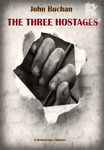
John Buchan is best known as being the creator of Richard Hannay in "The Thirty-Nine Steps". "The Three Hostages", first published in 1924, is his fourth of the 5-book series of the Richard Hannay novels.After distinguished service in the First World War, Richard Hannay settles into peaceful domesticity with his wife Mary and their young son. However, news comes to him of three kidnappings. With no more than a few tantalisingly cryptic lines of verse as clues, he is soon on the trail of Dominick Medina - a charismatic polymath but a man 'utterly and consumedly wicked'. As Hannay uncovers an international plot to twist innocent minds through hypnotism and blackmail, it appears that he has met his match in one of Buchan's most memorable villains.
-
8. John Macnab
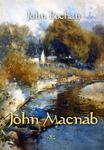
Three successful but bored friends in their mid-forties decide to turn to poaching. They are Sir Edward Leithen, lawyer, Tory Member of Parliament (MP), and ex-Attorney General; John Palliser-Yeates, banker and sportsman; and Charles, Earl of Lamancha, former adventurer and present Tory Cabinet Minister. Under the collective name of John Macnab, they set up in the Highland home of Sir Archie Roylance, a disabled war hero who wishes to be a Conservative MP.
-
10. The Thirty-Nine Steps
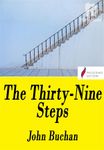
The Thirty-Nine Steps is an adventure novel by the Scottish author John Buchan. It first appeared as a serial in Blackwood's Magazine in August and September 1915 before being published in book form in October that year by William Blackwood and Sons, Edinburgh. It is the first of the five novels featuring Richard Hannay, an all-action hero with a stiff upper lip and a miraculous knack for getting himself out of sticky situations. The novel formed the basis for a number of successful adaptations, including several film versions and a long-running stage play. In 2003, the book was listed on the BBC's The Big Read poll of the UK's "best-loved novels." John Buchan, (26 August 1875 – 11 February 1940) was a Scottish novelist, historian, and Unionist politician who served as Governor General of Canada, the 15th since Canadian Confederation. After a brief legal career, Buchan simultaneously began his writing career and his political and diplomatic careers, serving as a private secretary to the administrator of various colonies in southern Africa. He eventually wrote p********a for the British war effort during World War I. He was elected Member of Parliament for the Combined Scottish Universities in 1927, but he spent most of his time on his writing career, notably writing The Thirty-Nine Steps and other adventure fiction. In 1935, King George V, on the advice of Prime Minister R. B. Bennett, appointed Buchan to replace the Earl of Bessborough as Governor General of Canada, for which purpose Buchan was raised to the peerage. He occupied the post until his death in 1940. Buchan was enthusiastic about literacy and the development of Canadian culture, and he received a state funeral in Canada before his ashes were returned to the United Kingdom.
-
11. The Path of the King
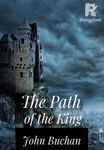
The Path of the King by John Buchan. This collection of fourteen short stories, The Path of the King offers a tapestry of historical episodes, from the Vikings through centuries of Norman and French, Flemish, English, Scottish, and American social, economic, and political life. Famous events such as the m******e of St. Bartholomew's Eve, the adventures of Daniel Boone, and much else provide the background for the men and women who successively have the blood of kingliness in them, however diluted. The subtly linked individual stories are used to suggest that kingliness may be dormant or fitful over several generations but will eventually reappear in someone, like Abraham Lincoln.
-
12. The Thirty-Nine Steps

I returned from the City about three o’clock on that May afternoon pretty well disgusted with life. I had been three months in the Old Country, and was fed up with it. If anyone had told me a year ago that I would have been feeling like that I should have laughed at him; but there was the fact. The weather made me liverish, the talk of the ordinary Englishman made me sick. I couldn’t get enough exercise, and the amusements of London seemed as flat as soda-water that has been standing in the sun. “Richard Hannay,” I kept telling myself, “you have got into the wrong ditch, my friend, and you had better climb out.” It made me bite my lips to think of the plans I had been building up those last years in Buluwayo. I had got my pile—not one of the big ones, but good enough for me; and I had figured out all kinds of ways of enjoying myself. My father had brought me out from Scotland at the age of six, and I had never been home since; so England was a sort of Arabian Nights to me, and I counted on stopping there for the rest of my days.
-
13. The Thirty Nine Steps (Illustrated)
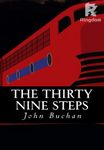
The Thirty Nine Steps, John Buchan’s groundbreaking espionage thriller featuring spy Richard Hannay, has been called the first great espionage novel. It has been embraced by each new generation and shows no sign of losing popularity. Richard Hannay arrives in London on the eve of World War I, where he meets an American agent seeking help in stopping a political assassination. Before long, Hannay finds himself in possession of a little black book that holds the key to the conspiracy — and on the run from both the police and members of a mysterious organization that will stop at nothing to keep their secrets hidden. The book has formed the basis for a number of film adaptations, notably: Alfred Hitchcock"s 1935 version; a 1959 color remake; a 1978 version which is perhaps most faithful to the novel; and a 2008 version for British television.
-
16. Mr Standfast
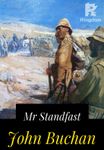
Mr Standfast by John Buchan. Mr Standfast is the third of five Richard Hannay novels by John Buchan. Set in the later years of World War I, Brigadier-General Hannay is recalled from active service on the Western Front to undertake a secret mission hunting for a dangerous German agent at large in Britain. He is forced to work undercover disguised as a pacifist, roaming the country incognito to investigate the deadly spy and his agents.
-
17. A Lodge in the Wilderness

First published in 1906, "A Lodge in the Wilderness" is a political novel by the Scottish author John Buchan. The novel relates an imagined conference arranged by a multi-millionaire, Francis Carey, to discuss Empire. The guests are contemporary figures from the upper and professional classes, nine men and nine women who have in common superb articulateness, wide experience, and an interest in understanding how Empire might be a positive influence. Buchan uses the opportunity to set out a variety of views on political and social issues, and to play Devil’s Advocate.
-
18. The Thirty Nine Steps
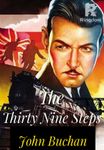
The Thirty Nine Steps by John Buchan is an adventure novel, It first appeared as a serial in Blackwood's Magazine in August and September 1915 before being published in book form in October that year by William Blackwood and Sons, Edinburgh. It is the first of five novels featuring Richard Hannay, an all-action hero with a stiff upper lip and a miraculous knack for getting himself out of sticky situations. The novel formed the basis for a number of film adaptations: Alfred Hitchcock's 1935 version; a 1959 colour remake; a 1978 version; and a 2008 version for British television.
-
19. Huntingtower
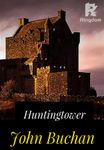
Huntingtower by John Buchan. In Huntingtower there is a retired Glasgow grocer who, starting out for a walking tour with a knapsack and a poetry book, finds himself, within twenty-four hours, up to the neck in one of the wildest plots of adventure it ever entered the heart of man to conceive. There is a beautiful Russian princess abducted by Bolsheviki and immured in the lonely castle by the sea; there are hidden jewels, a villainous innkeeper, with a g**g of 'tinklers' keeping watch over the princess until the archvillain arrives in a Danish brig to carry off his helpless victim. How these wicked ones are outmanoeuvred and disposed of by the strategy of Dougal, the captain of a little company of Glasgow street-boys, the 'Gombal Diehards,' with the aid of our retired grocer and a romantic poet, picked up on the march — such is the staple of this fascinating tale of humor and adventure. Dougal is a boy of grit and strategy with no English peer, his nearest kin in fiction being Huck Finn; and the spirited old peasant, Mrs. Morran, will live with the best of Barrie.
-
20. The Thirty-Nine Steps
(1915) This is the first of Buchan's novels to feature Richard Hannay. Dedicated To Thomas Arthur Nelson (Lothian and Border Horse); My Dear Tommy, You and I have long cherished an affection for that elemental type of tale which Americans call the 'dime novel' and which we know as the 'shocker'-the romance where the incidents defy the probabilities, and march just inside the borders of the possible. During an illness last winter I exhausted my store of those aids to cheerfulness, and was driven to write one for myself. This little volume is the result, and I should like to put your name on it in memory of our long friendship, in the days when the wildest fictions are so much less improbable than the facts. J.B.

